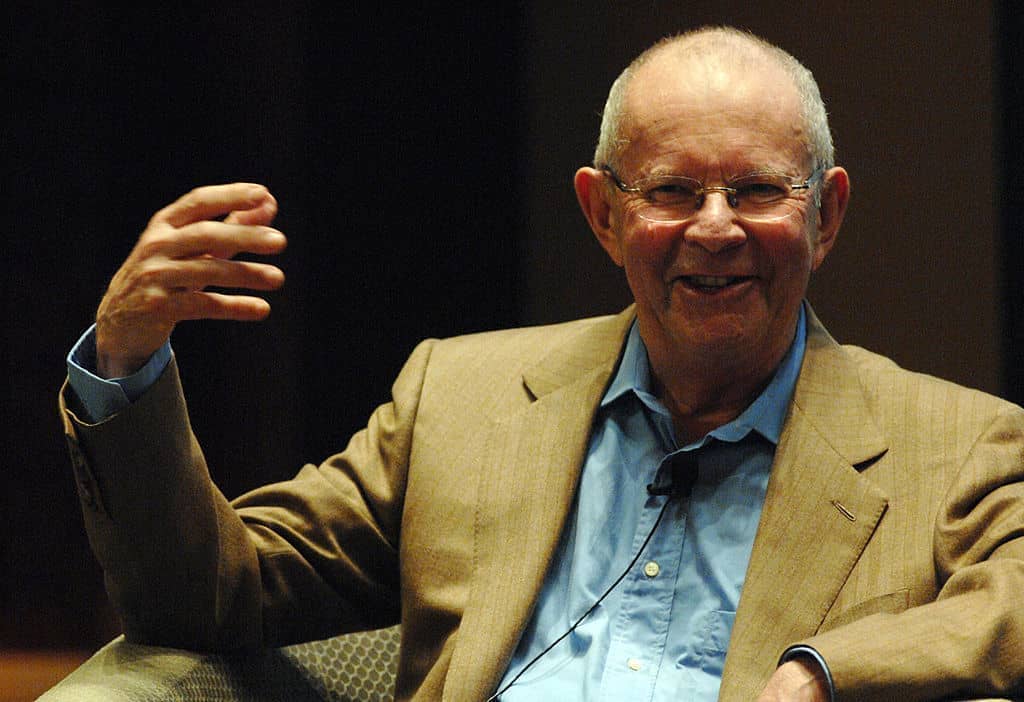A sparrow falls. The death of Wilbur Smith at the weekend deprives the world of one of the great luminaries of popular fiction of the second half of the last century. He joins Jameses Michener and Clavell, Hammond Innes and Harold Robbins in the great 1970s dad bookshelf in the sky. Kids of today will say: ‘Wilbur who?’ But I owe that man a debt of gratitude. He was one of the first ‘grown-up’ novelists I really got stuck into; along, of course, with Stephen King. Like Stephen King, he was grown-up in just the right way to appeal to children — really, a hop and a skip from Willard Price’s Adventure series, except with some real history in them and lashings of rumpty-pumpty. And the titles! The Sound of Thunder. The Angels Weep. Men of Men. The Burning Shore. Nothing ironic or elliptical there.
He belonged to the first age of giant fat paperbacks with embossed covers and the author’s name twice the size of the title. That he and the rest have now largely fallen into obscurity, in Smith’s case in his own lifetime, is testament to how quickly popular novelists date. Writers like that are the great invisibles of literary history. Million-selling potboilers, within half a century of their authors’ deaths, vanish from the fossil record and Smith’s, I bet, will do so too. Few academics will keep them alive by studying them; general readers’ tastes will move on.
Smith had a funny-shaped career, too. He had considerable early success and dosh — and then, by his account in order to avoid being seen as an entertainment franchise rather than a writer, he deliberately wrote an unfilmable book.
In his defence, I guess, you can make the limp but true observation that he was a man of his time
Towards the end of his career, though, he went all out for the entertainment franchise — and his last books were co-written in the James Patterson fiction-factory style. Still, he was never going to be a literary writer; not quite. Yet he was, in the phrase of cliche, a master storyteller. That’s no small thing. And he descended from other writers of imperial adventure — Haggard, Henty, Captain Marryat, Buchan and the like — whose reputations are going the same way and whose influence was greater than their memory.
His most celebrated works were the endless family sagas, which made him a sort of Barbara Taylor Bradford of the bushveld: the Courtney series, for instance, spanned three-and-a-bit centuries of narrative time and 55 years of publishing time. But I have, in some ways, the fondest memories of the stand-alones such as The Eye of the Tiger, with its Mozambique-boat-charter-gone-wrong plot; or the (as I remember it) uncharacteristically comical Shout At The Devil.
Smith’s novels — or, at least, the ones I read growing up; I didn’t have much truck with his ancient Egyptian folderols — had more than just action adventure of an old-fashioned macho stripe. They introduced the reader in drizzly England into the dramatic landscape and turbulent history of southern Africa. You were there in the savannah and the jungles, there amid the Zulu wars or the byzantine cross-border incursions and guerrilla violence of Mozambique and Namibia, Botswana and Rhodesia.
Oh, and that rumpty-pumpty. His books were of special interest to the average 12-year-old boy in the mid-1980s, it should be admitted, because in addition to all the melodramatic derring-do and the mass slaughter of game animals and minor characters, you could rely on encountering any number of melon-resembling breasts lolling about the place. (‘Through the thin cotton he found the erectness of her nipple and rolled it gently between his fingers. She reacted like a filly feeling the whip for the first time.’)
If the sexual politics were by today’s standards a bit dodgy, I dare say that if you ran a fine-tooth comb, or even a not so fine one, through the racial politics of those early books in search of grounds for cancellation you wouldn’t struggle to find some gotchas. The very first book has its hero being dunned out of a fortune by a wily Jewish financier with hooded eyes, for instance; and, though I couldn’t swear to it, I have a strong impression that my first encounter with the dismaying phrase ‘buck negro’ was in a Wilbur Smith novel.
In his defence, I guess, you can make the limp but true observation that he was a man of his time — and, in as much as it matters, that if he invites censure in the small things he got the big ones right. His fictional Cecil Rhodes is certainly no hero, Smith himself left Rhodesia because he couldn’t stick his namesake Ian’s politics, and his obituaries report that he claimed to have had his phone bugged in Apartheid South Africa and called Nelson Mandela his hero.
The thing that matters, though, was his gift for narrative. ‘I want to be remembered as someone who gave pleasure to millions,’ he wrote. And, at least for a generation, he will be.







Comments